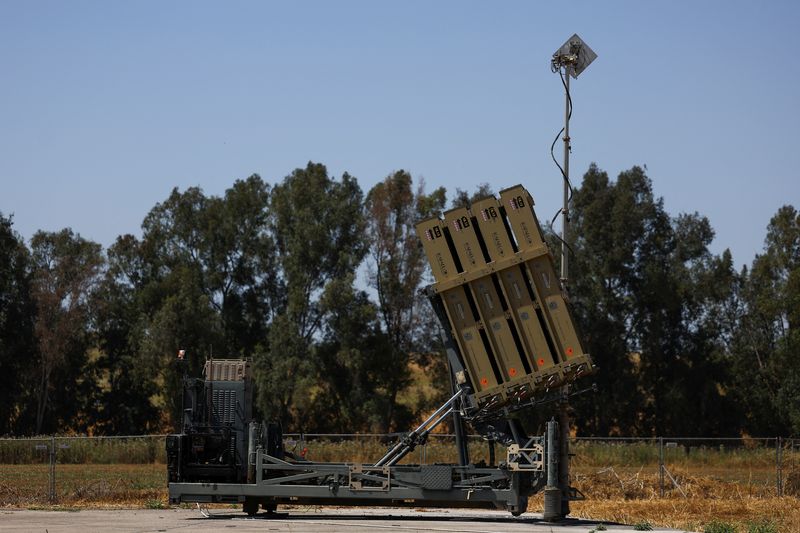By Andrew MacAskill
JERUSALEM (Reuters) -Ageing air defences have left Iran vulnerable to an Israeli attack if Prime Minister Benjamin Netanyahu decides to ignore global pressure not to retaliate directly for the unprecedented drone and missile salvoes of Saturday night.
Setting aside the wider diplomatic and strategic costs that are likely to be the strongest deterrent to any counter-strike, experts say Israel would have little trouble hitting targets inside Iran, which has an obsolete air force and indigenous air defence systems based on ageing Russian models.
Iran's weekend barrage demonstrated both the strength of its airborne armoury and Israel's formidable defence systems, which ensured that the hundreds of ballistic missiles, cruise missiles and drones launched against it caused only minimal damage.
Iran is a "superpower in tactical ballistic missiles and UAVs," said Zvika Haimovich, a former Israeli air defence chief.
Its air defences are another matter, built largely around Russian S-200 and S-300 anti-aircraft missile systems or a range of locally produced equivalents such as the Bavar-373, Khordad, Raad, Sayyad and Talash as well as old American and Russian warplanes, some of which date from the 1970s era of Shah Mohammed Reza Pahlavi.
Similar systems gave been deployed in Syria since 2015, giving Israeli pilots years of experience in dealing with them.
"Our air force and coalition air forces flew in this environment. They know how to deal effectively with this system," Haimovich said. "I will give them the respect, but that will not be the main challenge dealing with Iran."
Sidharth Kausha, a research fellow at the Royal United Strategic Institute in London, said the main challenge for the Israel may not be evading Iran's surface-to-air missiles, but being able to successfully strike military bases in western and southern Iran which require the use of penetrating bombs.
Kausha said Israeli aircraft, such as the stealth F-35 jets, which could evade Iran's air defence networks, typically carry smaller ordnance. But against deeply buried targets larger munitions may be needed, which would mean they may have to be carried externally on aircraft such as the F-16 - making these more detectable to radars. For safety, pilots might be more likely to launch them from further away.
"The Iranian air defence network is certainly not impenetrable to these aircraft, but this raises the risk of losses and the Iranian capacity to, at least in theory, intercept some incoming standoff munitions increases," he said.
STRATEGIC
Whether Israel is willing to risk a direct strike would partly depend on how confident it is that it can thwart further attacks by Iran, which described the weekend salvoes as reprisals for a lethal Israeli strike on its generals in Syria.
Further escalation could see Iran opting for more powerful weapons from an arsenal which analysts say includes more than 3,500 missiles and drones numbering in the low thousands.
Israel's multi-layer air defence is built around the high-altitude Arrow systems successfully used over the weekend, the mid-range David's Sling and the short-range Iron Dome which has fended off thousands of rockets fired from Gaza and Lebanon.
But these do not come cheap.
Although Israeli officials have given no details, according to calculations by a number of analysts, the price of Iran's attack probably amounted to $80 million to $100 million - but cost Israel and its allies around $1 billion to repel.
The problems currently being experienced by Ukraine in securing replacement ordnance has underlined the long-term impact on air defences subject to continuous attack from Iran or its proxy Hezbollah in Lebanon, which has an arsenal of thousands of missiles of its own.
On Wednesday, U.S. President Joe Biden urged Congress to pass an aid package that would replenish Israel's air defences.
Brigadier-General Doron Gavish, head of Israel's air defence task force, said Israel has been working overtime to rebuild its stockpiles in preparation for another possible attack from Iran or its proxies.
Were the Israelis to face Iran alone in a future flare-up, they could use Iron Dome and David's Sling as more thrifty fallbacks: Any missiles that might be missed by Arrow could be tackled by the lower-altitude systems.
"Without getting into the numbers, you could say that again, together with allies, mainly with the United States, but also from other countries, we feel that we have the needed supply," he told reporters at an Iron Dome battery in southern Israel.
Amos Yadlin, a retired Israeli air force general and chief of military intelligence, predicted Israel would not sit back and rely on its defences to repel attacks without responding to eliminate the threat.
"Iran is not the only side that knows how to attack," said Yadlin, who runs the Mind Israel strategic consultancy. "Israel has very significant offensive options. There will not be a situation where Israel just defends itself while Iran strikes."
(Additional reporting reporting by Parisa Hafezi, Dan WilliamsEditing by Peter Graff)
